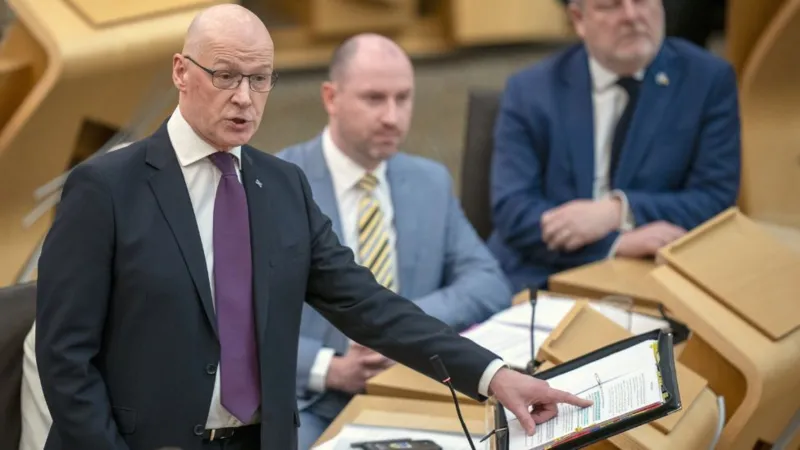The minority SNP administration’s spending plans have gained support from the Greens, Liberal Democrats, and Alba, while Scottish Labour MSPs will abstain from the final vote. The Conservatives remain the only party opposing the Budget, describing it as “dire and damaging.”
The £63bn Budget promises a record settlement for the NHS and local councils, a winter fuel payment for pensioners, and measures to address child poverty. Once approved, the Budget bill will proceed to receive Royal Assent before becoming law. The government’s tax and spending plans will take effect in April at the start of the new financial year.
This year’s Budget process was seen as a major test for the SNP administration. The party lost its parliamentary majority after ending its power-sharing agreement with the Greens, which led to Humza Yousaf’s resignation as first minister.
His successor, John Swinney, needed the backing of opposition MSPs to pass the Budget. Despite concerns of a potential snap election, Scottish Labour’s decision to abstain paved the way for the Budget’s approval. Swinney also secured support from the Greens, Liberal Democrats, and Alba through political concessions.
Parliament has already approved income tax rates for 2025-26. Lower tax band thresholds will rise by 3.5% in line with inflation:
- Basic rate (20% tax) applies to earnings between £14,876 and £26,561.
- Intermediate rate (21% tax) covers earnings between £26,562 and £43,662.
Despite these adjustments, more people will pay higher taxes due to “fiscal drag,” where rising incomes push taxpayers into higher brackets.
For those earning below £30,300, income tax will be lower in Scotland than in the rest of the UK—saving around £28 annually. However, someone earning £50,000 will pay approximately £1,500 more annually in Scotland compared to elsewhere in the UK.
Finance Secretary Shona Robison said Scotland’s tax system would raise a record £25bn in the coming financial year. The Scottish Fiscal Commission forecasts that the system will generate £838m more than if Scotland followed the UK tax model
The Budget outlines several major spending initiatives:
- NHS and Social Care: An additional £2bn for health services, bringing total investment to £21.7bn.
- Local Councils: A £1bn boost for local authorities to support public services.
- Social Security: Nearly £800m more for social benefits, including a universal winter fuel payment for pensioners.
- Child Poverty: Plans to mitigate the UK’s two-child benefit cap from April 2026, although no funds have been allocated yet.
- Infrastructure: A 12% real-terms increase in capital funding for public projects and a £30m “invest to save” initiative to improve efficiency.
To gain support from the Greens and Liberal Democrats, the government agreed to:
- Expand free school meals in eight council areas.
- Provide extra funding for drugs and neonatal services.
The UK government’s decision to increase employers’ National Insurance contributions from April has complicated the Budget. Scottish ministers estimate this will cost about £750m, including indirect public sector workers. The UK Treasury has offered £300m in compensation a figure Robison calls “unacceptable.”
To ease the pressure, the Scottish government has pledged £144m to cover 60% of local authorities’ National Insurance costs. However, councils say this still leaves a £100m shortfall, prompting the biggest council tax increases in 20 years as the national freeze ends.
Scottish Conservative finance spokesperson Craig Hoy criticized the Budget, stating, “The Tories are the only ones showing common sense and voting against this dire and damaging SNP budget.”
Scottish Labour’s Michael Marra argued the SNP had “failed to transform public services” but said his party would not block record UK funding from reaching frontline services.
In contrast, Green MSP Ross Greer defended the Budget, highlighting measures to lift children out of poverty and reduce public transport costs. Scottish Lib Dem leader Alex Cole-Hamilton also supported the Budget, citing substantial investments in key Liberal Democrat priorities.
The Scottish government has exceeded expectations by securing enough support to pass the Budget. However, with the next election scheduled for May 2026, the political alliances formed to pass this Budget may not last.
Finance Secretary Shona Robison remains optimistic, stating that the Budget will “deliver progress for the people of Scotland,” emphasizing increased funding for health care, local services, and social welfare programs.



